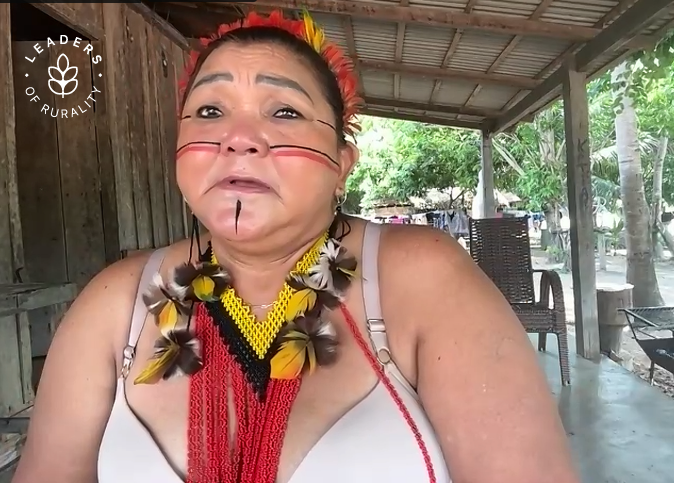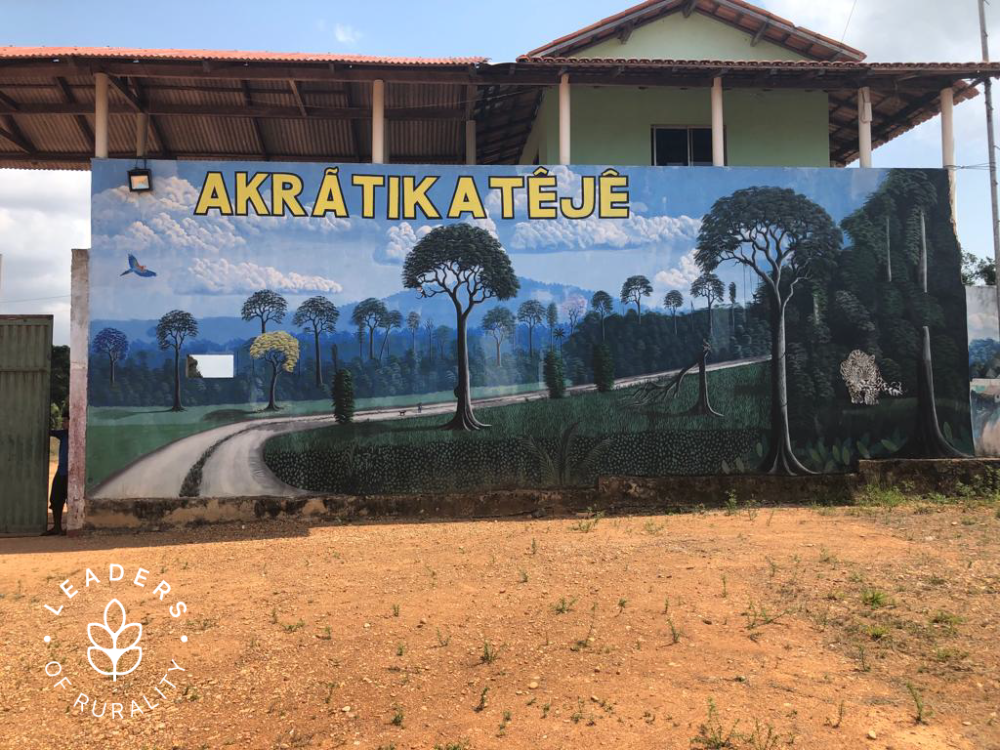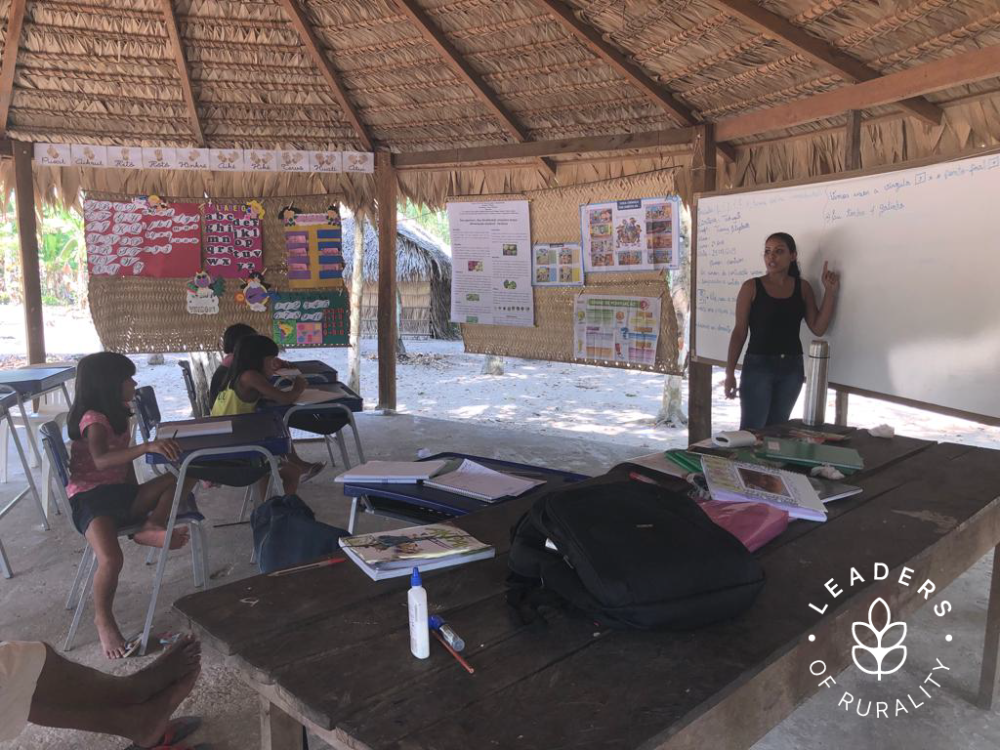The award is part of an initiative of the agency specializing in agricultural and rural development to recognize men and women who are leaving a mark and making a difference in rural areas of the Americas.

Marabá, Brazil, 29 January 2024 (IICA). The cacique (chief) of the Akratikatejé village, located in the northern state of Pará, Brazil, will receive the award in recognition of her organizational initiatives and commitment to entrepreneurship, harvesting and production, while also educating and raising awareness of the importance of conservation and environmental protection in the world’s largest tropical forest, the Amazon.
In addition to receiving the “Soul of Rurality” award, the Leaders of Rurality recognized by IICA are invited to participate in several advisory bodies of the agency specializing in agricultural and rural development.
“This award pays tribute to those who are playing a unique dual role: guaranteeing food and nutritional security by producing under all circumstances, and protecting the biodiversity of the planet. It also emphasizes their capacity to be positive role models in the rural areas of the region”, stated Manuel Otero, Director General of IICA regarding the initiative. He also emphasized the importance of recognizing leaders in the Amazon region, in this case Brazil, as well as in vulnerable communities.
Within the framework of the Leaders of Rurality program, IICA strives to ensure the recognition opens spaces for cooperation with state, civil society, and private sector organizations to gain support for their causes.
“These are people whose influence can be seen in the food that we eat—wherever it may end up—and in each plot of agricultural land and in the communities where they live. These are men and women who are leaving their mark and are the soul of rurality because they produce, plant, harvest, create, innovate, teach, protect and unite”, reflected IICA’s Director General.
“They embody positive and silent leadership, which is something we should spotlight and recognize. Above all, they are role models, because they transform, overcome adversity, and inspire”, added Otero.
IICA is working alongside its 34 Delegations in the Americas to select the #LeadersofRurality.
Katia Silene Tonkyre, the female cacique who challenges taboos and leads a community that produces sustainably and protects the Amazon rainforest
Google Maps satellite images show the Madre María indigenous reserve as an impenetrable, deep green blanket. Every day, Katia Silene Tonkyre, the first woman cacique (chief) of the Akratikatejé village, located in the Amazonian state of Pará, in the northern region of Brazil, watches over and worships this intact native rainforest.

Some 3,500 indigenous people live in the reserve, which spans close to 63,000 hectares. Outside its borders, which were defined by the Brazilian federal government in 1986, satellite images reveal extensive deforestation.
Fifty-four-year-old Katia Silene leads one of the 27 villages of the reserve, where 85 indigenous people from 23 families of the Gaviao da Montanha ethnic group live and are primarily dedicated to the collection, production and sale of chestnuts, as well as fish, honey and fruit.
A cluster of wooden houses and a lake give life to the community, which also has a health center and a huge, thatched roof supported by wooden columns that serves multiple purposes, including as a classroom for children and adolescents in the village.
Designated by the Inter-American Institute for Cooperation on Agriculture (IICA) as a Leader of Rurality of the Americas, the cacique is the daughter of the late Payaré, an esteemed cacique who fought for the rights of indigenous people and promoted entrepreneurship and eco-friendly production in the village. He fostered organization and the collection and production of chestnuts, passion fruit, açaí, cacao, cupuaçú and other Amazonian fruits, as well as animal and fish farming and beekeeping, which allowed for generating jobs and income.
Katia continued and perfected this legacy through the establishment of partnerships and the implementation of actions for the benefit of her community.
“I don’t agree with people who say they need to destroy the forest to raise cattle or invest in soybeans. We want our project to be sustainable. And we want to expand, but not by destroying nature. We value our products. There is no need to destroy. It is possible to strike a balance between both things: implementing the project while protecting and utilizing the forest, which is like a green pharmacy. We have our animals and we have our forest”, explains Katia.
“We are nature. We are the forest. We are the Amazon. When a tree dies, a part of us dies, because we are the root of this forest. And chestnut is our gold, but we also have açaí, cocoa, fish…and we add value to our production without harming nature”, says the cacique.
In the 70s, when Katia was a child, her village was forced out of Tucuruí, where a dam was built, and had to undergo a difficult resettlement process in the municipality of Bom Jesus do Tocantins, about 10 kilometers from the city of Marabá, in the southwest region of Pará.
There, they began harvesting castaña do Pará, also known as Brazil nut.

Six years ago, they set up a factory and a cooperative to process and market Brazil nut. The cacique is now seeking public and private sector assistance to improve power supply (from single-phase to three-phase power) in the village, to be able to operate machines that would enable them to produce 20 tons per harvest, guaranteeing income for the entire village.
She is also seeking technical assistance that would enable her, her family and her community to increase the village’s production of corn, cassava and chicken, as well as improve the commercialization of fish and build cabins and trails to attract tourists to the reserve.
“The path ahead involves producing in a sustainable manner and fulfilling the dream of my father, the cacique Payaré: to achieve an autonomous Akratikatejé village, with the forest still standing”, she remarks. She regrets not having storage facilities and a cooling chamber that would enable them to sell more products, such as cupuaçú, an exquisite fruit with high phosphorus and pectin content that is used to make juice, cakes and nectars and whose seed, which contains high percentages of protein and fat, is used to prepare a product that resembles chocolate as well as cosmetics.
“The açaí harvest is ending, and soon we’ll begin the chestnut and cupuaçú harvest. We have a lot of cupuaçú, but unfortunately, we are going to lose a part of it because we have no freezer or cold chamber where producers could store pulp”, she says.
Among other projects, the indigenous leader hopes to resume chestnut exportation. However, she will require technical assistance to build a small warehouse and furnish a small factory.
One of the cacique’s greatest sources of pride is the fact that the youngest members of the village have a strong sense of belonging to the reserve and the desire to remain a part of it.
“We are strong. In our region, no one is living out on the streets, or wanting to abandon the village, because our land is rich. We have fruits and fields where we can grow and farm. We have large amounts of honey and copaiba (the substance obtained from the copaiba tree, which is rich in oleic-linoleic acid and vitamin E and is used to manufacture soaps, balms and essential oils, and has moisturizing, anti-inflammatory, painkilling and antibacterial properties that provide a multitude of benefits). We are incredibly blessed and wealthy, and our wealth is our forest, which is still standing. There is no reason for any of us to leave. We have sustainable raw materials and a lot of wealth in our forest”, adds Katia Silene.
“Everything we do is for a better and healthier future, and a good quality of life. We want young people to value the land and our forest, which we have no need to cut down for wood or gold, because we have other riches. My father taught me to care about the future, to worry about tomorrow. I broke social barriers; the outdated models from the past prevented women from becoming chiefs. Us women are taking over more and more spaces, and we must continue making a difference to make things work”, she concludes.
More information:
Institutional Communication Division.
comunicacion.institucional@iica.int











